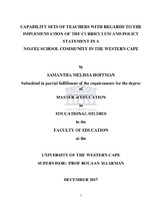| dc.contributor.advisor | Maarman, Rouaan | |
| dc.contributor.author | Hoffman, Samantha Melissa | |
| dc.date.accessioned | 2018-08-29T09:00:06Z | |
| dc.date.available | 2018-08-29T09:00:06Z | |
| dc.date.issued | 2017 | |
| dc.identifier.uri | http://hdl.handle.net/11394/6352 | |
| dc.description | Magister Educationis - MEd | |
| dc.description.abstract | Since the onset of democracy in 1994, education in South Africa has undergone many
developments and changes due to curriculum innovations and interventions. For more than two
decades, the government has been seeking to eliminate the divisions of the past by establishing a
society based on democratic values, social justice and the observance of fundamental human
rights as described in Act 108 of 1996 in the Constitution. The curriculum changes in South
Africa after 1994 had a huge impact on the education system as a whole, and classroom teaching
shifted from being largely teacher- centered to being predominantly learner-centered. Hence, the
newly revised Curriculum and Assessment Policy Statement (CAPS) was introduced (DBE,
2011) to provide all teachers with the same outline of what should be taught, when and how. The
government's efforts at improving teaching and learning as well as maintaining a high standard
of education are commendable, however, findings through this research demonstrate that CAPS
disregards the massive differences in terms of contexts within which schools operate and the
general lack of resources faced by certain schools.
The main aim of this research was to explore the nature of the capability sets of teachers with
respect to the implementation of the CAPS curriculum in a no fee school community in the
Western Cape. The research was conducted within the framework of a qualitative research
approach with a case study design. Classroom observation, focus group interviews and document
analysis were utilized as data collection methods. The capability approach of Amartya Sen was
applied to unveil the nature of teachers' capability sets in a no fee school in the Western Cape.
This study has established that there are several factors inside and outside the school, which
influence the implementation of CAPS during the teaching and assessment processes. Therefore,
recommendations are made that the policymakers should take into account the context and socio
economic background of the school and learners before changing the curriculum. | |
| dc.language.iso | en | |
| dc.publisher | University of the Western Cape | |
| dc.subject | Curriculum change | |
| dc.subject | Curriculum | |
| dc.subject | Curriculum and Assessment Policy Statement | |
| dc.subject | Capability Approach | |
| dc.subject | Capability sets | |
| dc.subject | Freedoms | |
| dc.subject | No-fee school | |
| dc.subject | Teacher perceptions | |
| dc.subject | Quintile 1 | |
| dc.title | Capability sets of teachers with regards to the implementation of the curriculum and policy statement in a no-fee school community in the Western Cape | |
| dc.rights.holder | University of the Western Cape | |

